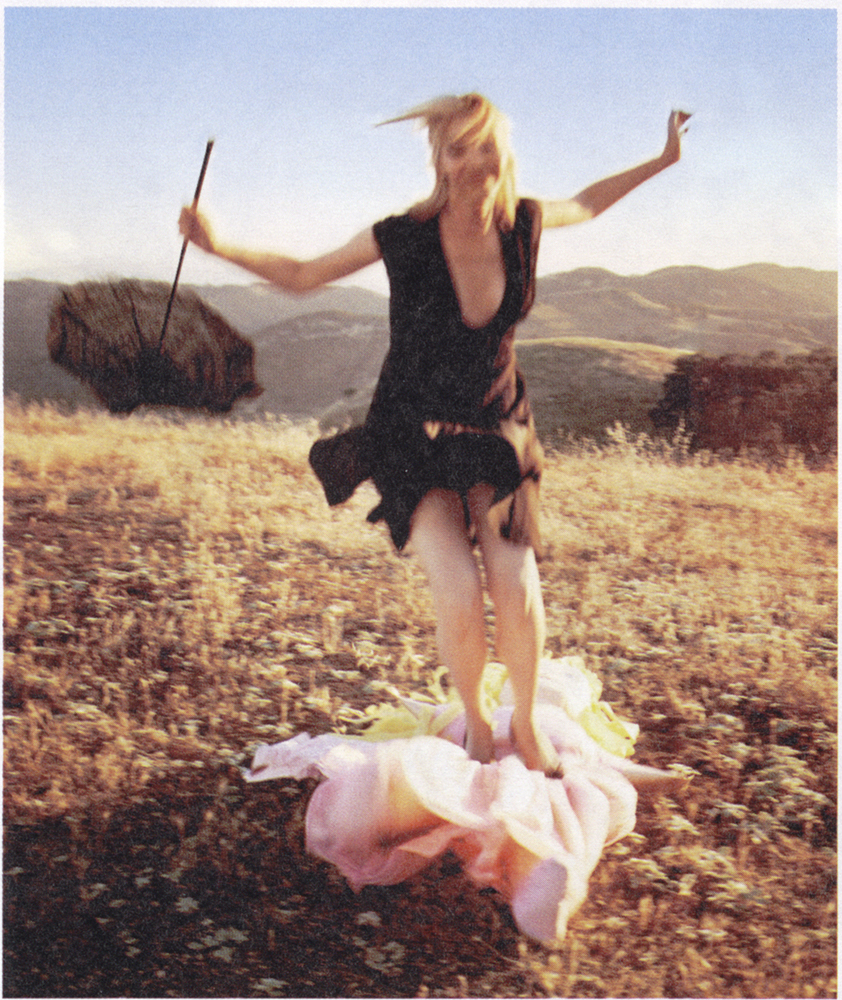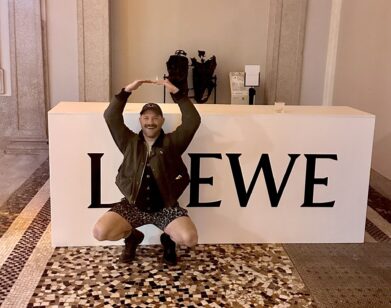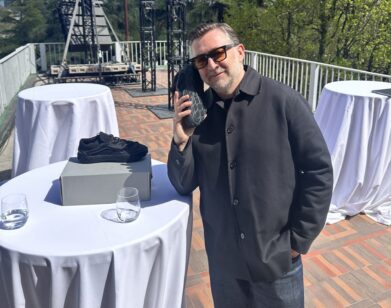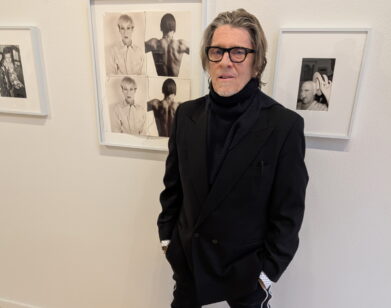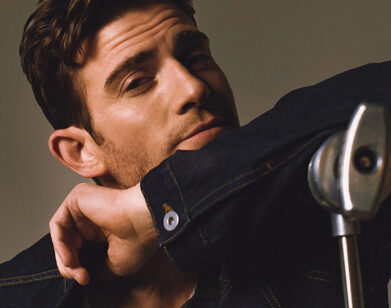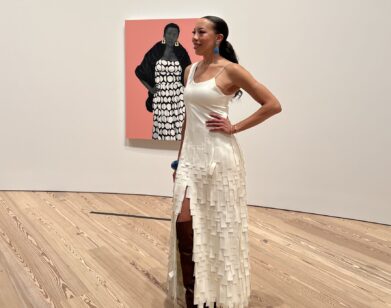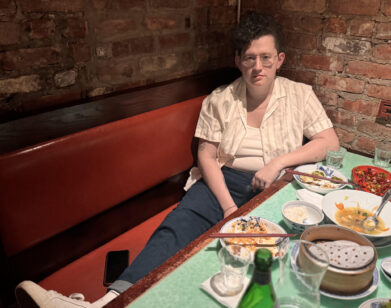New Again: Lisa Kudrow
After 10 seasons, the beloved television series Friends came to an end in 2004. Last week, rumors of a one-off Friends episode stormed around cyberspace. According to the likes of David Schwimmer and Marta Kaufman, however, the episode is not a Friends reunion, but rather a tribute to Friends‘ director James Burrows. Currently, Jennifer Aniston, Courteney Cox, Lisa Kudrow, Matt LeBlanc, and Schwimmer are set to participate in the special, which will air on Sunday, February 22 on NBC, along with cast members from other former NBC shows. Matthew Perry, who is currently starring in a play he wrote in London, will introduce the rest of the cast via video. Feeling nostalgic, we decided to revisit an interview with Kudrow from 2003, just before the final season of Friends and the premiere of Wonderland, a feature-length film in which Kudrow appears alongside Val Kilmer and Kate Bosworth.
Lisa Kudrow
By Sara Switzer
She’s got one of the quickest wits in Hollywood, but in her new film, she’s talking a walk on the somber side.
Having recently begun her 10th and final season of Friends, the show in which she charms us as the goofy Phoebe, Lisa Kudrow can also be seen flexing her significant acting chops in Wonderland, a dark, seedy drama examining multiple murders that took place in Los Angeles in 1981. In the film, Kudrow portrays Sharon Holmes, wife of porn king John Holmes (Val Kilmer), who was connected to the infamous—and still unsolved—slayings. Here, the actress opens up about letting go, great roles for women, and her life after sitcoms.
SARA SWITZER: I saw Wonderland the other night. You were great.
LISA KUDROW: Oh, thanks!
SWITZER: Have you seen the finished version?
KUDROW: No, and I won’t see the whole movie because it’s too scary.
SWITZER: It was rather violent.
KUDROW: Yeah, the script was too. But it was so compelling. And, you know, Sharon Holmes was not at the murders, so in order to play her I wouldn’t have to see them, have anything to do with them.
SWITZER: You were able to portray such a wide range of complex emotions playing her. How do you get to a place that allows you to access all of that?
KUDROW: Well, I have trouble describing characters because there is just too much going on in human beings. To be able to let you know who someone is in just a couple of words, I’d have to pick the most pronounced features of a character’s personality. And I always feel like I’m leaving out so many important little ones. And it’s the little ones that inform the big ones. It was made perfectly clear to me in the script who Sharon was, and then I got to meet her, and she confirmed it. After five minutes, I knew [the screenwriters] knew her inside out, and that my interpretation of her was in sync.
SWITZER: How did she feel about the movie?
KUDROW: She said it was surprisingly easy for her to watch, which is good. And she had a lot of praise for James Cox [Wonderland‘s director] and for me, which is the best. [laughs] She said, “You were awesome. You nailed me. You got it. Everything and beyond! You’ve got that iron maiden thing down.” So I don’t care what anyone else says about the movie or what I did in the movie. [laughs]
SWITZER: There were similarities between your Sharon character and your Lucia character in The Opposite of Sex [1998].
KUDROW: Yeah, there’s a sternness. There’s a rigidity.
SWITZER: Do you find that you’re drawn to those sorts of roles or that you get cast in them because they’re sort of the anti-Phoebe?
KUDROW: No, I don’t think they’re anti-Phoebe. I know that’s not part of my decision making process. It’s always the script, the story. With The Opposite of Sex, I loved the script, and I didn’t care how big or small the part was: I wanted to be part of it. And it was the same with Wonderland.
SWITZER: After you graduated from Vassar College and returned to L.A., your hometown, you worked as a researcher, right? What sort of research were you doing?
KUDROW: I was working with my father—he’s retired now—who was a headache specialist. And we were working on, [laughs] well, here’s the technical term: hemispheric dominance and its relation to headache types.
SWITZER: Okay…
KUDROW: Looking at people who are right-handed or left-handed and asking, Do you see any statistical trends with different headache types? The answer was no!
SWITZER: I read that Jon Lovitz inspired you to try performing. Was comedy something that you’d always enjoyed? It seems like quite a shift from the sciences.
KUDROW: Well, it starts with a cause. I’m the youngest in my family and everyone is very funny, and I was always trying to keep up with them. I just loved making people laugh—in school, with my friends, at slumber parties, always. And from elementary school on up through junior high school, I loved to perform. But I put it all away during high school and college. I thought, “That’s not actually something you do with your life.” But then I was compelled to try it after college. I just got overcome.
SWITZER: What was your experience like with the improve comedy troupe the Groundlings?
KUDROW: I had a really good experience with the Groundlings. I learned so much from improvisation. At first they wouldn’t let me start their program because I hadn’t done anything since junior high. I had to go to a teacher first, Cynthia Szigeti, and she was phenomenal. Fear wasn’t an option—or embarrassment. She just made you do it. She dragged stuff out of you. If it’s ever possible to force someone to let go, she did it. That was one of the most important things that ever happened to me.
SWITZER: And now you’re back for a 10th season of Friends. Are you excited?
KUDROW: Yes, very excited. It will be the last year and I have no clue how it’s all going to feel, how emotional that will be.
SWITZER: Do you ever feel trapped by the success of the show?
KUDROW: No.
SWITZER: Do you ever feel like it has dictated either too much of your life or too many other acting opportunities?
KUDROW: No. Never. I feel like I’ve always had opportunities, and I don’t feel like the show has ever kept me from doing anything. They [Friends‘ producers] have always been really generous about accommodating the schedule, and they don’t have to do that. No show ever has to do that because they own you and they’re certainly paying you enough to be there. But they did it every time, which was so great of them.
SWITZER: Have you thought about what you want to do after the show is finished?
KUDROW: A lot. One thing I really want to explore is writing.
SWITZER: Movies? Books?
KUDROW: I’m open to all of it. I just want to start writing, whether or not any of it is useable or marketable. At the very least, in a journal—not that that’s interesting to anybody, but that’s something I want to exercise.
SWITZER: Is there a dream role out there that you’d like to play? Or anything specific that you haven’t gotten to do that you’ve always wanted to?
KUDROW: I don’t even know if it’s possible, but if it were, I’d like to make those kinds of old movies where the women were articulate and intelligent and flawed and witty. You know?
SWITZER: I absolutely know! It seems as if we’ve gone backwards. It’s troubling to think that at one point you had those sort of roles—whether played by Bette Davis or Katherine Hepburn-and now they are so rare. It’s like reverse evolution or something.
KUDROW: It is. Those women behaved like women. And now, unless someone’s, like, 50 or older, they’re meant to behave like girls. And it’s a broad stroke: It’s not just a moment of being vulnerable and girlish, as it was in those [older] movies. It’s the whole color of the character. Or else she’s outrageously aggressive.
SWITZER: It’s interesting, because with the Sharon Holmes character you found a complexity in the middle ground, which in many films seems to be lacking. Maybe you don’t need to be at either end of the spectrum; there’s a lot to be discovered in the middle. Maybe we just have to go deeper.
KUDROW: Possibly. I think it take a certain kind of writer—one who understands and likes women.
SWITZER: Right. Now, it seems to me that you do a very good job of keeping your personal life separate from your professional life.
KUDROW: Yeah, well, I don’t go out. [laughs]
SWITZER: There you go! Is that a conscious decision? Was there a point when you said, “I’ve got to create some distance here?”
KUDROW: Yeah. I think it’s very easy to get caught up and think that how many hits you get in a magazine because you were seen out somewhere has anything to do with a director’s opinion of you, and whether they could use you or not. Maybe I’m wrong, but I just don’t think it does. There are plenty of things that I have to go out to do as it is, so to pile on these evening outings—which to me are unnecessary—doesn’t make sense. Though there was a time there when I thought going out was so fun. You go to the awards shows, especially the Golden Globes, and “Oh, there, Kathy Bates! Oh my god, we’ve got to talk to her!” She’s wonderful, but you start to realize there’s a huge difference between acquaintances and friends. I don’t know how it happens, but suddenly that’s not a priority anymore.
SWITZER: Was that a hard lesson to learn? Or did you sort of know that going in?
KUDROW: I knew going in. I mean, I observed enough that I knew an actor’s career goes up and down and back up again. Your standing in this business can’t be your whole identity; otherwise, you’re doomed.
THIS INTERVIEW WAS ORIGINALLY IN THE NOVEMBER 2003 ISSUE OF INTERVIEW.
New Again runs every Wednesday. For more, click here.

